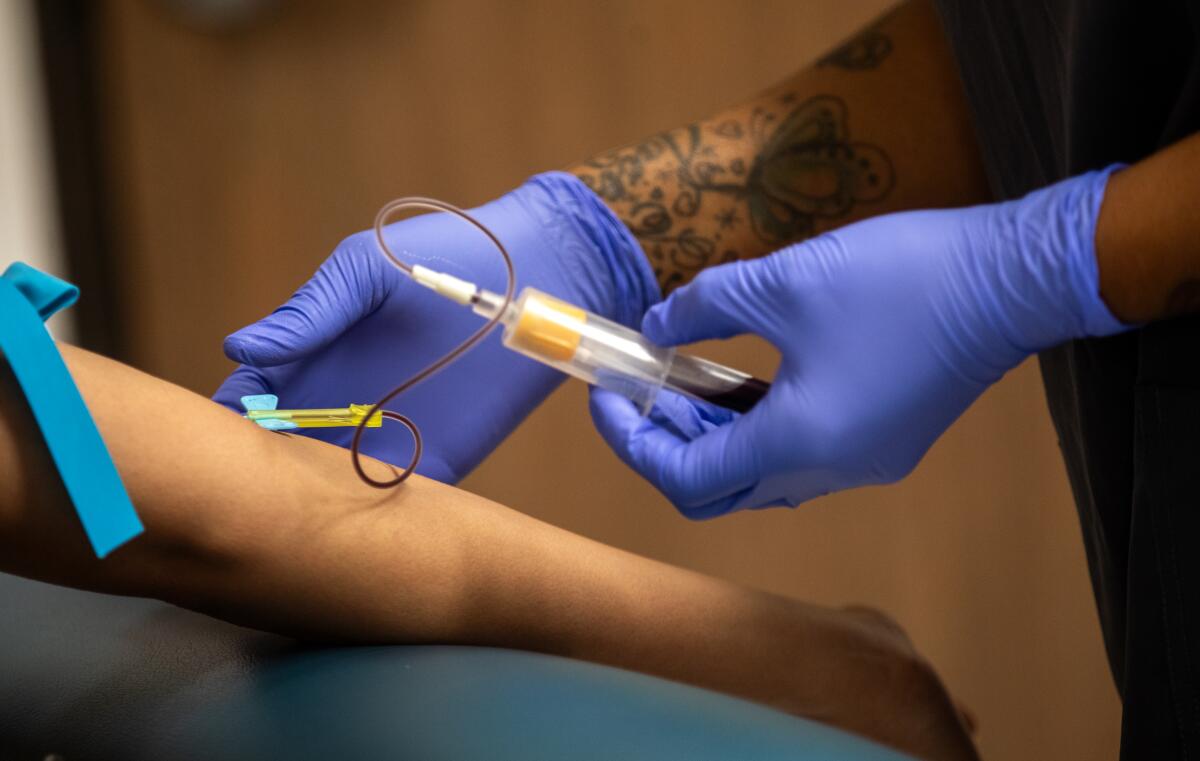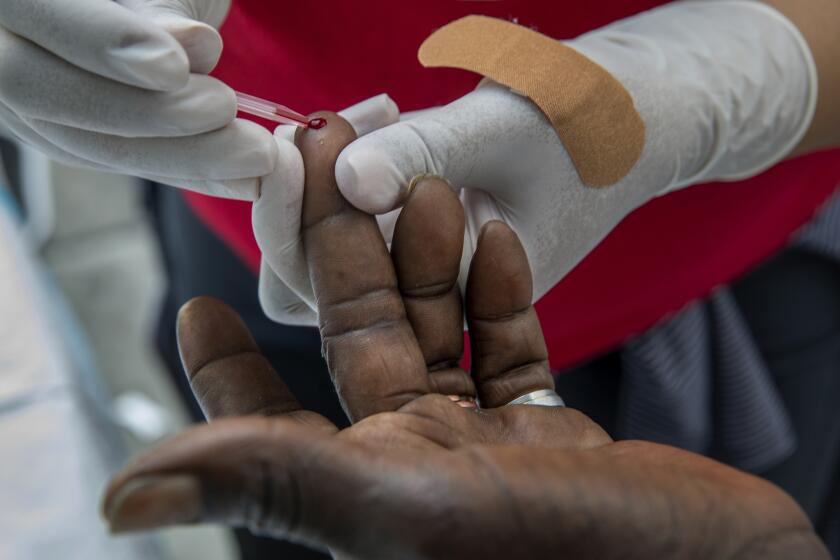STDs have been on the rise. Who should pick up the tab for testing?

- Share via
Inside the glassy waiting room of a Hollywood clinic, a 33-year-old man sat and listened for his number to be called over the beats of a Mariah Carey song.
“It’s just really easy. You don’t have to make an appointment,” said the man, who comes to the AIDS Healthcare Foundation clinic every two or three months to get tested for sexually transmitted diseases.
Nor does he get asked about his health insurance, which has sometimes been a frustration elsewhere. “And I like the discretion,” added the man, who declined to give his name. “You don’t want people in your business.”
For months, the AIDS Healthcare Foundation has been resisting a push from Los Angeles County for such providers to ask people if they have insurance that can cover costs related to STD tests, a step that the Department of Public Health says is needed in order to spare public dollars for more services.
The Public Health Department has long contracted with community organizations to test people for sexually transmitted diseases. In the past, the county shouldered all the costs of processing those tests at a county lab.
County officials said that for several years, their contracts have included a requirement for groups to check if clients have a “third-party payer” that could foot the bill for testing, such as public or private insurance.
Many groups had already started doing so before the county stopped routinely covering the costs of laboratory testing in January, the department said.
If someone has no insurance to cover such testing costs, the organizations can have the county pay for it, although they cannot exceed the overall amount of money allotted to them under their contracts.
Getting insurers to pay for testing has been a strategy for strapped public health departments around the country, seen as a crucial way to offset the costs of providing free care to the uninsured and other needed services as federal funding to combat sexually transmitted diseases has fallen short of the need. L.A. County Public Health said it was hunting for “as many revenue streams as possible” to ramp up STD efforts.
“This type of work cannot just be exclusively publicly funded,” said Dr. Rita Singhal, the department’s chief medical officer and director of the disease control bureau. “The more revenue for this effort, the better.” In the past, the department said it spent between $1.1 million and $2.3 million annually on testing for STDs.
But some local groups focused on sexual health argue that the change undermines their push to make STD testing easy and routine. Across the country, syphilis and gonorrhea have been on the rise — a longtime trend exacerbated by the interruption of preventative services as health agencies grappled with COVID-19. L.A. County has seen a persistent rise in STDs over the last decade, although there are some early signs of progress.
“If you’re trying to control a disease that’s spiking, you have to take away any deterrents, any obstacles” to routine screening, said Michael Weinstein, president of the AIDS Healthcare Foundation.
More and more babies in L.A. County have been infected with syphilis in the womb, which can lead to stillbirth, neurological problems, blindness and other conditions.
Dr. Ward Carpenter, chief health officer for the Los Angeles LGBT Center, said health providers want people to get tested regularly even if they have no symptoms, and “the harder that is, the more barriers that are in place, the less likely people are to do that.”
Among the concerns: Young adults who are on the health plans of their parents may not want to hand over insurance information, fearing their tests could show up in paperwork seen by their families. Such privacy concerns could also affect people who are insured through a spouse, Carpenter said. And clients who are “underinsured” may get stuck with a bill later, he said, and decide to stop getting regularly tested.
California lawmakers are considering legislation, Assembly Bill 1645, that would prohibit insurance plans from imposing out-of-pocket costs for recommended screenings for sexually transmitted diseases. L.A. County Public Health said it was backing that bill and “exploring as many models as possible to reduce the impact of health insurance screening,” including the use of technology to smooth the process.
Dr. Jeffrey Klausner, a USC Keck School of Medicine professor and formerly an STD prevention director in San Francisco, was nonetheless concerned by the county’s move, calling it “a penny saved, a pound foolish.”
“It’s going to come back and bite them,” Klausner said. “There will be a decrease in testing ... particularly among the most vulnerable groups and young people.”
So far, L.A. County Public Health said its early data suggest STD testing has not fallen this year compared with last. Nearly 12,000 tests were reported to the county between January and March — a similar volume to the past — and the department believes the total amount of testing by community groups is likely higher because some are not being reported to the county.
The county agency said it was too early to tell whether it is spending less on testing, but it expects insurers to pick up more costs over time.
The move was welcomed by Dr. Tony Mills, chief executive of the Men’s Health Foundation, which also contracts with the county. Most people in California are eligible for some kind of health coverage, Mills said, and asking about it provides an opportunity to connect patients to coverage and other care.
If people are uneasy about a test showing up on paperwork for a shared plan, “we can easily get around” that issue by tapping other funds, he said. But L.A. County needs to be “the payer of last resort. ... That’s going to save more money for the county to use on other things that are integrally important.”
“It’s just asking the providers to do a little bit more work,” Mills said.
A new law will make California the first state to require that health insurance plans, including Medicaid, cover home STI tests.
The Public Health Department said that to boost the number of people screened and treated for STDs, it needs to support a range of screening models, including home testing and street medicine teams. Mario Pérez, director of its division of HIV and STD programs, said that to make a dent in the STD crisis, the department wants most community groups to screen 10,000 to 20,000 people each annually.
“If you want to support that level of volume, having multiple revenue streams at your disposal becomes very important,” he said.
One survey of more than 4,000 patients at STD clinics found that more than half had some kind of health insurance coverage, and 57% of those who were insured were willing to use it for their visit.
Among those waiting at the AIDS Healthcare Foundation clinic on a recent afternoon was Walter, a 32-year-old who said he liked going to the Hollywood site because his visits usually took less than a half hour.
He used to get routinely tested at an urgent care facility, but stopped when it no longer accepted his insurance. Still, he wasn’t fazed by the idea of being asked for insurance information in the future.
“For me, it’s not a deterrent or a big deal,” he said.
Another patient named Joe sought out the Hollywood clinic after getting results back from a test he had taken in the U.K. Even asking people about insurance will discourage people from STD testing and treatment, said the 26-year-old, who had been worried about obstacles he might face to getting treatment as a foreign tourist.
“It will put fear in people, and as soon as you start doing that, people stop doing it,” he said.
Federal funding for preventing STDs has barely budged in the last decade, resulting in STD programs losing about 40% of their buying power and forcing them to rely more heavily on other funds, said Stephanie Arnold Pang, senior director of policy and government relations for the National Coalition of STD Directors.
A survey of public health departments found the vast majority were billing Medicaid for STD services and more than two thirds billed private third-party payers. San Francisco City Clinic, a public clinic focused on sexual health, will bill Medi-Cal — the California Medicaid program — if a patient has it, but doesn’t bill private insurance or charge patients, according to the San Francisco Department of Public Health.
“It makes a lot of sense that jurisdictions are looking to have folks use insurance because it is another payer source in a system that’s very challenged,” Pang said.
But doing so has on-the-ground impacts: Carpenter, at the LGBT Center, said the organization had to hire more staff to collect billing information and testing takes longer as a result.
The AIDS Healthcare Foundation advertises free testing without an appointment and wants to get people in and out within an hour, Weinstein said. That speedy, walk-in model “will go out the window” if it has to screen everyone for insurance, he said.
Weinstein, an outspoken figure whose group has clashed with the county and other government agencies in court, said in late August that his group would not ask clients for information about third-party payers.
The Public Health Department, however, said the AHF had indicated to the county that it would begin screening clients for insurance. In response, the AHF said it would screen existing clients — people who are already AHF patients — when they come in for testing, but not “all individuals who walk in to our testing sites.”
Under the county contracts, groups can turn to the county to cover lab costs for such testing only after they have checked that patients don’t have insurance they could bill instead. The AHF said it expects an increase of at least $1 million annually in lab costs as a result of the county rule.
The Public Health Department said it was continuing to work with the AHF on adjusting to the change, as well as with any other groups “to review and resolve any unintended consequences tied to this approach.” It has been hammering out a spending plan for an added $10 million allocated by the county for STD services, including efforts to “cover critical program elements not covered by” other payers.
More to Read
Sign up for Essential California
The most important California stories and recommendations in your inbox every morning.
You may occasionally receive promotional content from the Los Angeles Times.















